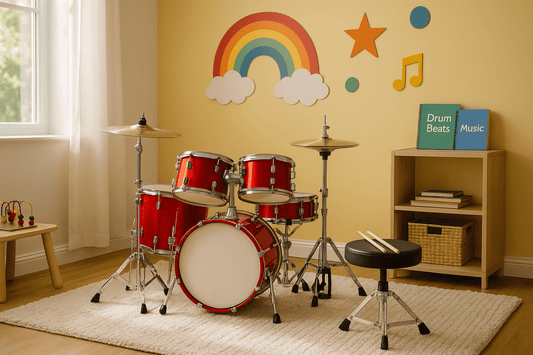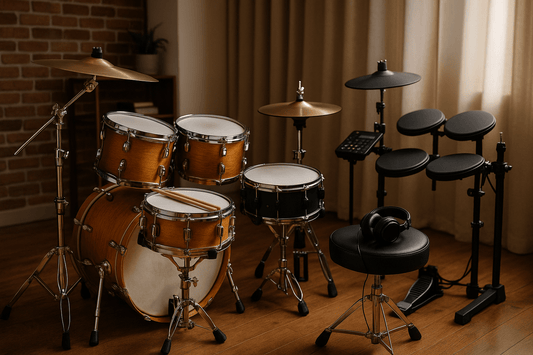Electric Drum Kit vs. Acoustic Drum Kit: Which is Right for You?
Introduction
When it comes to choosing a drum kit, one of the primary decisions you'll face is whether to go for an electric drum kit or an acoustic drum kit. Each option has its unique features and advantages. This article aims to provide an in-depth comparison between electric drum kits and acoustic drum kits, helping you make an informed decision based on your preferences and requirements.
What is an Electric Drum Kit?
An electric drum set is a modern alternative to acoustic drums. It consists of electronic pads or triggers that produce sound when struck. These pads are typically connected to a sound module, which generates the drum sounds and allows for customization. Electric drum kits often include features such as built-in metronomes, pre-set drum patterns, and the ability to connect to computers or sound systems for recording or amplification purposes.
What is an Acoustic Drum Kit?
On the other hand, an acoustic drum kit is the traditional setup that most people imagine when they think of drums. It consists of real drums made of shells, drumheads, cymbals, and hardware. When played, acoustic drum kits produce sound through the vibration of the drumheads and the resonance of the shells, creating a distinct and natural sound.
Comparison of Sound
Sound is a crucial factor to consider when choosing between an electric drum kit and an acoustic drum kit. Acoustic drum kits offer a rich and organic sound that is difficult to replicate electronically. The tonal nuances, dynamic range, and sheer power of acoustic drums make them the preferred choice for many professional drummers. Electric drum kits, while capable of producing a wide range of sounds, may not deliver the same level of authenticity and depth as acoustic drums.
Portability and Space
Another aspect to consider is portability and space requirements. Electric drum kits are generally more compact and lightweight compared to their acoustic counterparts. They are easily foldable and can be transported without much hassle. This makes them ideal for drummers who need to move their kit frequently or have limited space for practice. Acoustic drum kits, on the other hand, are bulkier and require a dedicated space for setup and storage.
Noise Level
One advantage of electric drum kits is their adjustable volume and the ability to play with headphones. This allows drummers to practice quietly without disturbing others. Acoustic drum kits, on the other hand, produce a louder sound that can be disruptive, especially in residential areas. While drum mutes and other dampening techniques can reduce the volume to some extent, they may affect the natural feel and responsiveness of the drums.
Cost
Cost is often a significant consideration for drummers, especially those on a budget. Electric drum kits tend to be more expensive initially due to the technology involved and the inclusion of a sound module. However, they can save money in the long run as they require less maintenance and replacement of drumheads or cymbals. Acoustic drum kits, although relatively cheaper upfront, may incur higher costs over time for tuning, replacing drumheads, and other necessary maintenance.
Maintenance and Durability
Acoustic drum kits require regular maintenance to keep them in optimal playing condition. Drumheads need to be replaced periodically, and tuning the drums is necessary to achieve the desired sound. Electric drum kits, on the other hand, have pads that are more durable and do not require tuning. However, electronic components may require occasional maintenance or replacement, depending on usage.
Customization Options
One of the advantages of electric drum kits is the extensive customization options they offer. Drummers can change the sounds of individual drums, add effects, or even replicate other instrument sounds. This flexibility allows for creative experimentation and tailoring the kit to suit various musical styles. Acoustic drum kits, while offering some degree of customization through different drumhead choices and tuning, do not provide the same level of versatility.
Learning Curve
For beginners, the learning curve can play a significant role in the decision-making process. electronic drum kit beginner are generally considered easier to learn and play due to their more forgiving nature. The electronic pads provide consistent rebound and can be set to specific sensitivity levels. Acoustic drum kits require more technique and control to produce the desired sound. However, some drummers prefer the challenge and tactile experience of playing acoustic drums.
Performance and Feel
The performance and feel of a drum kit are essential factors for drummers. Acoustic drum kits offer a unique tactile experience with the ability to feel the vibrations and resonance of the drums. They provide a more natural and expressive playing experience. Electric drum kits, while lacking the same physical feedback, can offer features like mesh heads that closely mimic the feel of acoustic drumheads. However, some drummers may find that the responsiveness and dynamics of acoustic drums cannot be fully replicated.
Versatility
When it comes to versatility, electric drum kits have the upper hand. They can produce a wide range of sounds and can even emulate other instruments. This versatility makes them suitable for various music genres and recording applications. Acoustic drum kits, while limited to the sounds produced by the drums and cymbals, excel in delivering the authentic drumming experience for genres like rock, jazz, and blues.
Recording and Amplification
Both electric and acoustic drum kits can be recorded and play with a drum amplifier, but each has its unique considerations. Electric drum kits can be easily connected to recording equipment or sound systems, allowing for precise control over the captured sound. Acoustic drum kits require careful microphone placement and balancing to capture the desired sound accurately. Additionally, room acoustics play a more significant role in the recording of acoustic drums.
Suitability for Different Music Genres
Different music genres have varying requirements when it comes to drum sounds and playing techniques. Acoustic drum kits are widely favored for genres like rock, pop, jazz, and blues, where the natural and powerful sound of the drums is highly valued. Electric drum kits find their place in genres such as electronic music, hip-hop, and pop, where precise control over sounds, samples, and effects is essential.
Conclusion
Choosing between an electric drum kit and an acoustic drum kit ultimately depends on your personal preferences, musical style, and specific needs. Acoustic drum kits provide an authentic and dynamic playing experience, particularly suited for genres that demand a natural drum sound. Electric drum kits offer versatility, portability, and customizable options, making them a practical choice for drummers who require flexibility and creative experimentation. Consider your budget, space limitations, noise restrictions, and the kind of sound you aim to achieve before making a decision.
FAQs
-
Are electric drum kits suitable for live performances?
- Yes, electric drum kits can be used for live performances. They offer the advantage of easy sound control and the ability to connect to sound systems.
-
Do electric drum kits require external speakers?
- Electric drum kits can be played with or without external speakers. They often have a headphone output, allowing for silent practice.
-
Can acoustic drum kits be used in home recording studios?
- Absolutely! Acoustic drum kits can be recorded in home studios, but proper microphone placement and acoustic treatment are essential for capturing the desired sound.
-
Are electric drum kits suitable for beginners?
- Yes, electric drum kits are often recommended for beginners due to their adjustable sensitivity and forgiving nature.
-
Can I convert an acoustic drum kit into an electric drum kit?
- Yes, it is possible to convert an acoustic drum kit into an electric drum kit using drum triggers and a sound module. However, it may require some technical expertise and adjustments.




